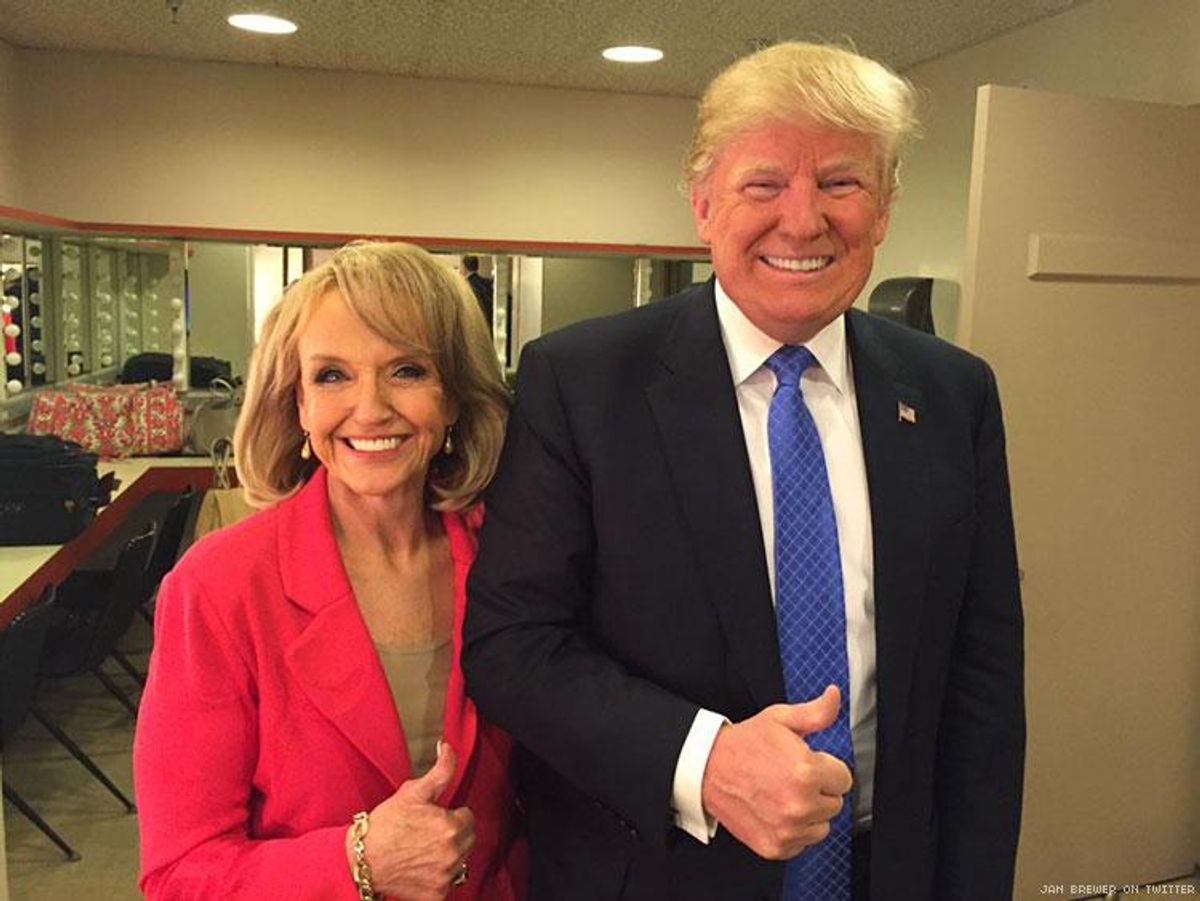The "woman card" is now evolving into the "race card."
Donald Trump had launched into the general election by accusing Hillary Clinton of playing the "woman card" on the issues, which supposedly meant she sought support based solely on the fact she'd be the first woman president, and that anyone who opposed her would be considered sexist.
"She's going, 'Did you hear that that Donald Trump raised his voice while speaking to a woman,'" Trump said at a rally. "Oh, I'm sorry. I'm sorry. I mean, all of the men -- we're petrified to speak to women anymore; we may raise our voice."
Clinton found that so amusing she printed up an actual "woman card" and started selling them to raise funds. Now that Barack Obama, the country's first black president, is more actively campaigning against Trump, the Republican candidate's surrogates claim they're seeing the "race card."
An incensed Jan Brewer said on CNN's State of the Union Sunday that she's tired of being called a bigot just for supporting Trump. "Dang it, I get fed up," said the former Arizona governor.
Mind you, polls show Americans widely agree that Trump has made racist comments. A Quinnipiac University poll taken in the swing states of Florida, Ohio and Pennsylvania found that almost six in 10 voters said it was "racist" for Trump to question Judge Gonzalo Curiel's fitness to hear a case because of his Mexican heritage.
It's not just one poll, either. A majority this month told YouGov the same thing. The history of Trump's comments being called racist is long. Trump said Mexicans coming across the border were criminals and rapists. He suggested Jeb Bush "speaks Mexican" and "this is America, English!" Trump also said Bush only opposed his immigration ideas "because of his wife," who was born in Mexico. He threw a Latino journalist out of a news conference for asking about immigration. And he has said, "The overwhelming amount of violent crime in our major cities is committed by blacks and Hispanics." This is also the man who nearly ran for president last cycle on a birtherism platform, suggesting Obama wasn't born in the United States.
Still, Brewer is incensed to be grouped with Trump merely for supporting him.
"We need to discuss policy," said Brewer, claiming it was the Democrats who were distracting voters from policy. "Every time with President Obama and Hillary Clinton, every time you disagree with them, it doesn't matter which subject it is, you're a bigot or you're a racist! And I'll talk immigration until we go home tomorrow night. Absolutely, absolutely."
Brewer famously shook her finger at Obama on the tarmac as she welcomed him to her state, supposedly lecturing him about immigration policy. It's true, Brewer probably would talk about deporting immigrants ad nauseam. Some have already pointed out that the Arizona governor who signed the "papers, please" law, formally known as SB-1070, was being called a racist long before Trump ran for president. This is also the governor who once said most undocumented immigrants are drug mules.
Not only is Brewer angry about being called a racist, though, she says it's offensive, and she isn't the only Republican taking up this mantle.
"President Obama just always comes tearing after Republicans constantly, calling names and calling people bigots and racists," she said on CNN. "And that's their big comeback, you know. And it's absolutely ridiculous. To see a president speak like that is offensive. Very offensive."
Former Virginia Attorney General Ken Cuccinelli, who is often called a bigot by LGBT Americans, was on the same CNN panel and quickly agreed. "This is a fallback when you have a president who cannot defend his policies and their outcomes, and so he jumps immediately to the race card, racist card in particular," he said, claiming he's encountered the so-called race card before. You'll remember Cuccinelli as the guy who defended a law that made sodomy illegal and called for removing sexual orientation from antidiscrimination ordinances.
But it was respected Republican strategist Alex Castellanos on ABC's This Week on Sunday who cautioned against "insulting half of the American people who are supporting Donald Trump" by calling them racist.
Some are going out of their way not to call Trump voters racist. It's just Trump, they say, although even that's been evolving.
Salonposited in March, "Not all Donald Trump supporters are racists, but most racists are Donald Trump supporters." Writer Sean Illing outlined that rule after an ABC/Washington Post poll found that those voters who worried that whites were "losing out" were far more likely to vote for Trump than his opponents in the GOP primary.
Brewer and Cuccinelli suggest voting to elect a person who says racist things doesn't extend any guilt their way for the racist language (or policies) that would be elevated by that decision.
House Speaker Paul Ryan is probably the textbook example of rationalizing voting for Trump. This month, Ryan strongly disavowed Trump's attack on the federal judge's Mexican heritage. "Claiming a person can't do their job because of their race is sort of like the textbook definition of a racist comment," the Republican politician said, before just as vigorously insisting he'd still vote for Trump for president.
The thing that set off Brewer was a comment Obama made on the Trump phenomenon. Here, for posterity, it that comment:
"And we don't have time for charlatans," he said during a fundraiser in Seattle, Washington. "And we don't have time for hatred. And we don't have time for bigotry. And we don't have time for flimflam. And we don't have the luxury of just popping off and saying whatever comes to the top of our heads."


















































































